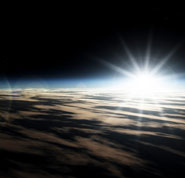The Speculative Cosmos
"Early dark energy, the force invoked by the Johns Hopkins group, might represent a third episode of antigravity taking over the universe and speeding it up. Perhaps all three are manifestations of the same tendency of the universe to speed up occasionally. If so, it would mean that the current manifestation of dark energy might turn off one day."
"...If dark energy remains constant, everything outside our galaxy eventually will be moving away from us faster than the speed of light, and will no longer be visible. The universe will become lifeless and utterly dark. But if dark energy is temporary -- if one day it switches off - cosmologists can contemplate a sensible tomorrow."
"The dark energy currently in the universe actually has increased over cosmic time, according to a recent report in Nature Astronomy. If this keeps up, the universe could end one day in what astronomers call the Big Rip, with atoms and elementary particles torn asunder -- perhaps the ultimate cosmic catastrophe."
Dennis Overbye, science writer, The New York Times
 |
| NASA Dark Energy |
From nothing arose everything. It did not take a celestial overseer six days to create the world. It took nature no time at all to create everything that exists. Time itself had no existence before nature took it upon herself to give birth to the universe and all that inhabits it, including thee and me, although thee and me represent an incidental, infinitesimally minuscule portion of a wee corner of a constellation, itself lost in relative time and space in the infinite immensity of the cosmos.
And when one contemplates the truly amazing structure of the world we live in, and our own quite incredible mind-cerebral functioning as a supreme work of excruciatingly detailed architecture, wondering as we do how it is we have a soul and a mind and what, in fact they actually represent within nature, the puzzle simply keeps expanding -- just like the universe.
If we're speaking time, and we are, rather casually in the thoughts above, the universe is 13.8-billion years old. Old, old. We being relatively recent additions. Experiments in nature? There have been countless earlier biological species that have come and gone, do we consider them nature's expendable experiments that failed to mesh with the larger plan? Will the entire experiment, which is to say the universe one day self-destruct?
In the universe's childhood at 100,000 years it represented an expanding mass of energy; particles, radiation, a switched-on experiment that great minds interpret from clues and intuit with sheer brain power as the never-ending search for the origins, purpose and meaning of the universe and life absorbs the minds of geniuses.Those minds grasp a theory that the switched-on energy field flooded an empty space.
Another 100,000 years passed and the field is abruptly terminated, leaving the universe to speedily distribute itself throughout welcoming space, filling that vacuum that nature is said to abhor. According, that is, to astronomers from Johns Hopkins University who suggest this field's existence answers to a puzzle in astronomy, how and why it is that the universe appears to expand swifter than it 'should'.

"If we're going to be serious about cosmology, this is the kind of thing we have to be able to take seriously", Harvard theorist Lisa Randall stated. She should know. We of course, wouldn't. Among some researchers the inference of the existence of previously unknown subatomic particles would answer the question. The Johns Hopkins group, however, favour the presence of hitherto unknown energy fields.
Dark energy is a force field that is known to urge upon the universe quicker expansion, while a new report suggests that very dark energy may be in the process of becoming stronger and denser where in future the result might become atoms ripped asunder, leading to the end of time. No actual evidence exists for these hypothesis; they could all be in error, or if correct the story of the origin, history and fate of the universe may have to undergo a rewrite.
Then there are quasars which arise from supermassive black holes centring galaxies; the brightest objects in nature, visible across the universe which researchers traced to the history of the cosmos about 12 billion years ago with the understanding that the rate of cosmic expansion has deviated from expectations during that time frame. A theory of dark energy as inconstant, altering, growing denser, stronger over cosmic time has arisen.
If this is a correct model, dark energy may just represent a particularly virulent, even implausible form identified as phantom energy whose existence might imply that as objects speed up, they lose energy. Therefore, the push from phantom energy would grow with no hold-backs to eventually overcome gravity and tear the Earth apart, as the universe expands. Oh.
 |
| Brian Stauffer, The New York Times |

0 Comments:
Post a Comment
<< Home